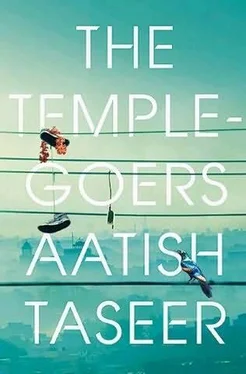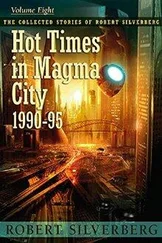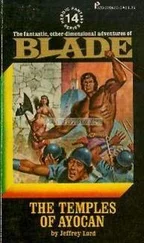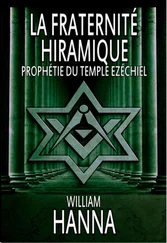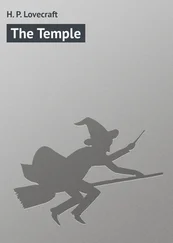His information impressed me. How did he know of the temple visits? Clearly not from Megha. Then another possible route took shape in my mind and gave me a fresh sense of Sanyogita’s unhappiness: she must have spoken to Ra, Ra to Kris. Seeming to enjoy the effect of his knowledge on me, he added, ‘And are you going to this jagran?’
I nodded, wishing to give him no extra pleasure.
‘When is it?’ he blandly asked.
‘In a couple of days.’
‘When exactly?’
‘Saturday.’
‘Hmmm, around the time my sister gets back. She better not try to go.’
‘Why?’ I asked.
‘Because we’ll kill her,’ Kris blandly replied.
We had come to the park’s tall iron gates, which were never open.
‘Well, I better be going,’ Kris said, stepping through the green turnstile. A Jorbagh taxi was waiting for him and the uniformed chauffeur had opened the back door for Beyoncé, who showed not the slightest willingness to jump in on her own.
‘Kris,’ I asked, as the chauffeur helped Beyoncé into the car, ‘how’s the writing going?’
‘Pretty good, buddy. Thanks for asking. Should have a story out soon in a US mag.’
‘The one you read?’
‘No, no, are you crazy? My poor mother’s blood pressure would blow her head off. No, a much gentler story. And you? I hear you’re writing too.’
‘No. Yes. I mean nothing; it’s all gone cold on me. A complete blockage. I’m beginning to feel I have no material.’
‘Sorry to hear it, man. But keep at it. There’s always a breakthrough round the corner.’
With this, he got into the car, Beyoncé panting on the seat next to him, and drove away.
On the morning of the jagran, Aakash had a different hairstyle. It was no longer ‘messy’, but parted in the middle and combed back in the style of an eighties hero. He had a little orange mark at the centre of his forehead from the inaugural puja that morning. We finished early at Junglee and he asked if I would drop him off at the nearest metro station. He had to go back to Sectorpur and help with the preparations. Sixty kilos of wheat had to be turned into puris before eight p.m.
Factoring in a standard one-hour unit of delay, and that we would be awake all night, I left the house at eight fifteen. But by eight forty-five, just as Sectorpur’s flyovers and cramped sprawl came into view, Aakash began calling to see where I was.
‘Five minutes away.’
‘Good. Come fast.’
We drove past the 16 Base Repair Depot and took a left after the fruit seller’s. It was a clear mild night, hardly cold for November. Uttam entered the Air Force Colony, and even before we’d come as far as Aakash’s street, we could see the preparations. On one side there was a blue water truck and a park bounded by banana, neem, ashok, Alstonia scholaris and gulmohar trees. At the centre of it, a large white tent, with scalloped satin skirting, flapped lightly in the wind. On the right was the community centre, a single-storey, pale yellow building. In an open cemented area in front of it, a few hundred people, many of whom were children, sat on the floor on long strips of green carpeting.They ate from leaf thalis coated in a silver laminate, which glistened in the bright light falling on the diners from halogen lamps overhead. Young men and boys walked with bent backs down the line, serving great spoonfuls of chickpeas, vegetable curry and spongy puris from buckets.
Aakash stood among the diners, in his black capris and beige and white knit T-shirt. He came to meet me outside when he saw the car drive in with a look of tired exhilaration. There was a little piece of puri stuck to his cheek. ‘Hi, man. What’s you doing, man?’ There were others from the gym around him: Mojij in a pink shirt, almost with cuffs, and Montu in a tight T-shirt that made him look even fatter than he was.
After his initial pleasure at seeing me, Aakash’s manner changed to that of a child interrupted in the middle of a game. Having observed the formality of asking if I’d like some tea, he passed me on to his little brother.
When I failed to recognize him, he said irritably, ‘It’s Anil. You met him in Haryana, remember? When we went to the temples?’
I did remember; it was just that then, as now, my perceptions were overwhelmed.
As Aakash walked away, he yelled, ‘Give him a stiff cup of tea.’ Anil nodded and we began to walk towards the flat. But we had barely taken a few steps when the power failed. A red city sky suddenly fell over the jagran. A few stray invertor-run lights glowed, the odd naked bulb, but the colony was in darkness.
The air became filled with voices, men in Aakash’s family and colony calling the electricity people, appealing to them to turn the electricity back on as there was going to be a jagran that night. The friendly responses they seemed to be receiving, the exchange of first names, some stray laughter, gave me an intimation of how the religious occasion would have served as common ground, how it might have made human the usually clinical communication between citizens and government servants. The man on the other end might also have lived in a colony with a jagran and was perhaps happy to see what he could do.
We walked towards Aakash’s apartment block, which even in the mixture of moon and tube light seemed to have received a fresh coat of peach and beige paint.
‘It has!’ Anil said. ‘They did it in the summer.’ He worked at a travel agency and was telling me that, despite the recent terrorist attacks, tourists, especially Spanish tourists, were still coming in large numbers. He had just been in Pushkar, leading a group, and was thrilled at how many temples there were in a small area. ‘We handle inbound and outbound tourism, but inbound is naturally more interesting.’
‘Why?’ I asked as we made our way into the candle-lit flat.
‘Just because it’s more interesting,’ he replied, ‘to show people what there is in your country than to promote another. I doubt there’s another country in the world with as much to see as India.’
Everybody loved India; everybody worked hard. Mojij, who’d followed us in said he was at Junglee every day until two, then at college till six, doing a BA in media studies. Anil, whose English was good, much better than Aakash’s, said he’d been learning French as well, but had never found the time to immerse himself in the language. We sat in the pink front room, in the light of a few slim red and yellow candles. Their glow expanded and shrank, sometimes throwing light as far as the lime-green pagodas, the red rose and the sequined Radha and Krishna, sometimes leaving them in darkness. I noticed that the cushion covers of the brown wooden sofas had embroidered scenes of chalets with fences and gardens. A few moments later, Ma Sharma, in a purple salwar kurta, came in with sweet, strong cups of tea. The little sweeper ran around half naked in a red and white Hawaii T-shirt. The power cut had scattered the mosquitoes into the general darkness, but occasionally one of the women in the house could be heard slapping a fleshy arm or thigh, and loudly exclaiming, ‘Machchar!’ I was beginning to wonder what I had come for when the sound of an exhaust fan and the dim sputtering of lights announced the end of the power cut. A slight feeling of embarrassment ran through the room at the sudden exposure.
Just then, Amit, Aakash’s elder brother, appeared in the metal doorway and ushered us downstairs, insisting we eat. Before being led into the cemented area, I stopped at the durbar.
I knew that the word literally meant court, but also had the connotation of a viewing or an audience, of being in the presence of the deity. Amit explained that the boys in the colony had begun the jagran five years before. This came as a surprise; I thought it would have been going on for many years. To think of so large a religious occasion as recent – and put on by young people – was to be aware instantly of new prosperity – and the gods to which people felt it was owed. Amit said that the boys of the colony had just been sitting around one day when they thought, the other colonies have jagrans, why don’t we? They put together a committee, gathered funds and that year put on the first jagran. It was an instant success and the numbers grew each year, with people’s relations coming from out of town for the event. They were very proud this year of the size of the durbar. And they had reason to be; it was vast. Giant papier-mâché mountains, like the mountains of Ladakh, rust, yellow, purple, blue, towered over the tented enclosure, recreating Kailash, Shiva and Parvati’s alpine dwelling. On every summit of every peak there were gods, Shiva, Krishna, orange-tongued and orange-palmed Kali, and at the highest summit, Santoshi Ma, the mother of contentment. Below her, 108 brass lamps were arranged like a champagne pyramid, representing the goddess’s 108 forms. The tent was still empty and a group of colony children were playing on its thick floral carpets. In one corner, a small band warmed up on a podium with Roland equipment, keyboards, brown wooden drums and powerful black speakers. Halogen lamps and free-standing heaters, filled with blackish-orange coals, heated the empty tent.
Читать дальше
